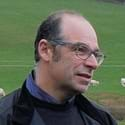Following the Second World War, the Pommery family settled in the Burgundy region, on the EARL de la Vallée farm. Starting out farming cattle, pigs and sheep, in 1966 the farm shifted its focus entirely to cattle production, which Vincent has developed and grown since he began managing the farm in 1991.
With an eye on sustainability, Vincent set about increasing the farm’s focus on environmental protection while maintaining economic viability. With 250 Charolais cows to care for, more attention has been given to rotational grazing and improving animal welfare.
Vincent is passionate about creating strong farmer-to-farmer collaborations as a means to sharing resources and knowledge. Through these partnerships he believes all parties will grow, creating more sustainable operations that translate into economic business benefits.
Key areas of sustainable practice
Vincent secured a contract with an energy provider to produce renewable energy from 1,700m2 of photovoltaic cells fitted to the roof of his newest barn. The contract is helping to generate renewable energy for the local community – contributing to the electricity requirements of up to 60 homes. Additionally, 60 km of hedgerows are maintained, with the wood harvested to create woodchip that is used as an alternative material for cattle bedding, while the drier, higher-quality woodchip is sold locally for home heating. The woodchip sold for heating is also helping to offset approximately 60,000 liters of fossil fuel.
To ensure the farm’s carbon footprint can be managed and reduced, Vincent undertakes an environmental assessment using the CAP’2ER tool. This tool calculates the environmental impact of the farm, providing action plans to help determine ways in which certain impacts can be reduced.
In 2002, all cropland was returned to pasture to protect the water source of a nearby village. Returning these areas to grassland has also increased the carbon sequestration abilities of the soil.
A portion of Vincent’s pastures are designated under Natura 2000 – a network of nature protection areas made up of important conservation zones, including specific habitat for protected species such as the yellow-bellied toad.
Vincent has placed increased importance on animal welfare and carries out welfare assessments using the quantification tool BoviWell. Working with the farm’s veterinarian, a parasite control plan has been developed in which parasites are detected in fecal testing, following which appropriate treatment can be determined.
Calves on the farm are disbudded at under three weeks of age, during which local anesthetic and analgesia are used. The farm’s vaccination strategy strives to protect and improve calf health and reduce the need and reliance on antibiotics.
In partnership with five local farmers, Vincent established an employers’ alliance. Through this organization, which now employs four people, each farmer is able to pool and share labor resources. This reduces staffing costs and increases workforce efficiency.
The farm is also a member of Terr’Eau, a farmer cooperative that was formed in 2002. This cooperative, which now includes 280 members, was created to facilitate the purchase of shared farming equipment and machinery.
To ensure secure supply contracts with a guaranteed sale price, heifers are sold in partnership with another local cooperative, SICAREV, with cattle being sold to Moy Park on a contractual basis.
The farm is involved in the Charte des Bonnes Pratiques d’Élevage (CBPE). The program is concerned with topics such as legislation, animal traceability, herd health and welfare, animal feed, worker safety and environmental care.
An environmental assessment, using the CAP’2ER tool, as well as welfare assessments are also undertaken at EARL de la Vallée. Both assessments are part of the agri-ecological strategy of McDonald’s France.
Learn more about Vincent’s story at EARL de la Vallée
Explore the case study, where you’ll find additional details on how closely EARL de la Vallée has aligned with the Flagship Farmers Program’s key areas of sustainable practices, what external research reveals about the producer’s actions and how improved sustainability is benefiting them.

“I want to build on the efforts of my grandparents and my parents who worked on this farm. Although our family farm has changed over the years, I still bring the same passion and care that the first generation did. I don’t see this farm as my job, it’s my life.”



